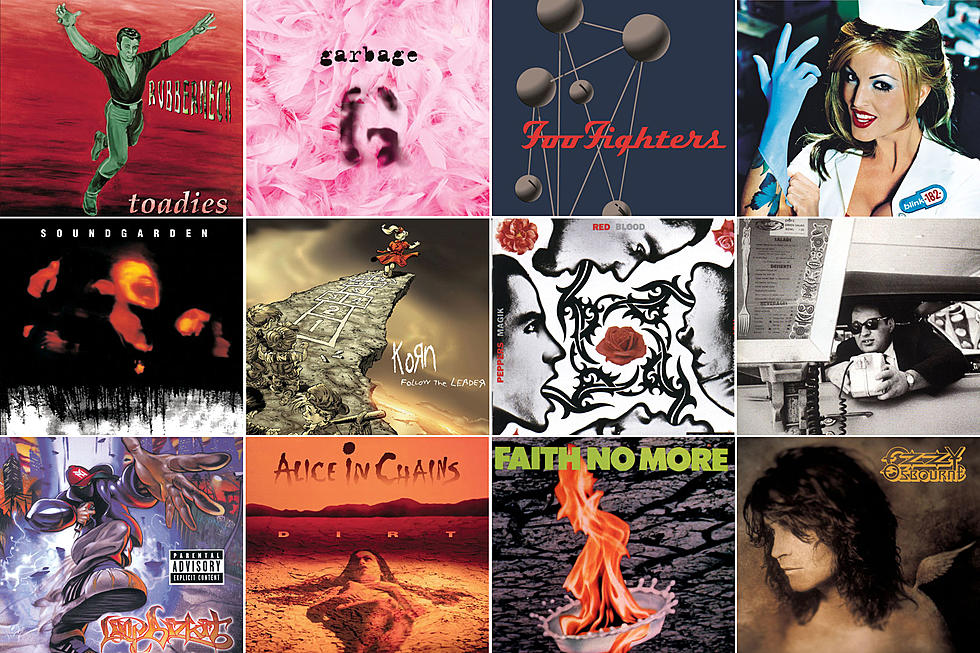
How Rock Bands + Radio Got Screwed in the ’90s
There's no doubt that music, how we consume it and how it gets made, has changed significantly in a post-Napster world, but if you want to look a little closer at what precipitated the downfall of rock music and the music industry in general, you need to go back a few years further into the '90s. In a very informative video, music producer-turned-YouTube personality Rick Beato and music industry vet Jim Barber break down some of the corruption in the music industry and show us how many bands actually got screwed financially during the '90s rock heyday.
Beato got his footing as a producer in the '90s, and his ability to play multiple instruments also came in handy while working with a number of acts as well. In more recent years, he's become an online personality. As for Barber, the industry vet has done everything from radio promotion to being a rock manager, producer and an A&R executive, so their level of knowledge from the behind-the-scenes of the industry that most aren't privy to is well established.
For this episode of Beato's interviews, the two industry vets decided to break down a discussion they've often had about the ills of where things went wrong in the music industry which in part has led to the model that we exist under today.
"It really started in the mid-'90s around 1996 and it eventually led to the demise of rock music, but really of most music. This particular corruption happened on so many levels that it's a really convoluted story," explains Beato at the top of the video.
How Did the Telecommunications Act of 1996 Impact Radio?
The Telecommunications Act of 1996 was signed by President Bill Clinton, which led to the rise of large corporate radio giants and many of the locally owned radio stations getting bought up in the process.
"The original idea before then was you should have local ownership of media and you should have as many different voices as possible, and the people who wanted the telecommunications act wanted to say that you would have more leverage in the marketplace if you had you had 100 stations," explains Barber. "What you miss before 1996 is if you own five or six stations, you had to have individual program directors for every one of the stations you own, and what happened after that, when you have 100 stations owned, corporate America hates duplication in jobs, so they fired all the local program directors and put one person in an office in New York or Atlanta to program all the stations."
But with fewer voices in power, that led to a more homogenized radio presence in the overall media landscape.
"Most of the people I've interviewed talk about one station really breaking them ... pretty much everyone I've interviewed from these huge bands, one station breaks them. It's very rare that something jumps right out, like a Nirvana jumped out with putting the video on MTV and it just blew up," says Beato, with the pair discussing how DJs began to lose influence over what they could play.
The two industry vets recall that rock and alternative radio essentially becoming about two people that were programming a majority of the stations across the country, with Beato noting that they were paid both by the record labels and the radio stations.
"They would get a particular sum of money from every single station they got an add on even though they were in control of the playlist," explains Beato. "They were basically paying themselves to put the records on the air in a weird way," adds Barber. Beato also recalls one of the programmers being a band manager who would get paid for the radio airplay by the band when they were the person who put them on the radio and decided how many spins they would get per week.
How Did Fewer Voice Impact What You Heard on Radio?
This then started to have an impact on how records got made. As Barber explains,
"What you have is really the taste of one or two individuals determining what goes on the radio, so people start making their records and mixing and mastering them in a way that they think might appeal to this person who controls all these radio stations." As such, records started to blur together as there were typically the same group of producers and a handful of mixers that would work most of the major radio records.
"Sometimes you'd listen to the radio and you'd hear 20 songs in a row that were all mixed by the same person and they could have the same drum samples, everything, the same bass sound, same type of compression thing happening," says Beato.
"When you're doing your testing for your market, you realize, 'Wait, I have to play records that were made before 1995 to not have people turn my station off,'" recalls Barber. "It wasn't a 'the bands are all terrible situation,' it was that records don't sound good on the radio anymore so people are gonna go back and play old records. So what becomes rock and alternative radio is a hybrid of one or two new records and a bunch of oldies."
How Producer Managers Impacted Artists Bottom Line
Both Beato and Barber then break down the rise of the "Producer Manager" in the '90s, who seemingly had a hand financially in every step of an album creation.
As Beato reveals, these producer managers handled the producers that got hired for many rock records, but they also had a financial stake in choosing the recording and mixing engineers and the head of A&R for a major label was also a client.
"They would negotiate their contract with the record label. And then they'd get a piece of the signing bonus or 10 percent of the contract. In addition, that A&R person would hire a producer that the manager also manages and then they would hire a mixer that the producer manager also manages. The producer managers were making a percentage, 15 percent I think of the producer's money," Beato said in his breakdown.
He adds, "In addition to doing that, every producer I worked with that I knew at the time had their own gear. Why did they have their own gear? Because their producer managers told them to buy their gear so they could rent it back to the bands so that the labels would pay for it."
What Else Did a Producer Manager Get Financially?
In his breakdown, Beato reveals that many producers would then charge the band to rent their amps and instruments on top of what they were paying for the studio, while another big thing that happened often was drum rental and daily maintenance charges that could run up a big tab as well. So while the producers would get a cut of all the rentals, the producer manager was then taking 15 percent of that.
Plus, producer managers also brought in "percentage points" for mixers on the record, which equates to a percentage of the money that the band would get for songs that became hits off the record.
"What people didn't realize at the time is that this made no difference to the record companies because it wasn't coming out of the record company share of the sales, it was all coming out of the artist share," explains Barber.
The Impact of Napster and Illegal Downloading
As we all know now, the impact of Napster and illegal downloading impacted the music industry going forward forever. What this meant for the music industry model was that the days of "feeding at the trough together" were over, as music fans were no longer prone to spend $18.98 for a CD, which ultimately led to a domino effect of changes.
READ MORE: Metallica Lawyer Explains Why Band Was Right to Sue Napster
The two men recall significant budget cuts on what labels were willing to spend to make a record since they no longer had an audience willing to pay what the going rate was. As a result, royalties were harder to come by and fewer bands were getting signed.
But, as Barber states, the decline of radio and the impact it had on how albums were recorded then made the music industry more susceptible to a major downfall once Napster came about.
"I will maintain forever that if records had sounded better, that there had been more variety and there had been more opportunities for more bands to break that Napster would have been a blow, but it wouldn't have been fatal," he explains.
Beato recalls, "A&R people were afraid to sign things that sounded original because every time they'd sign something they were risking their job," while Barber adds, "They were risking their job because radio had changed so much that you couldn't find a rogue promotion person or a rogue radio station to find out if your record was a hit."
"We both have friends who were DJs that by the early 2000s, there was no creativity left in the job for them," says Barber. "They were told what to play and at best you'd get two or three records, and you had to play the same kind of record in the same part of the hour during the day and it was allegedly scientific about what would get people to listen to the radio more and all of that research basically destroyed what people loved about radio in the first place."
It's an interesting discussion on the breakdown of the music industry. Check out the full chat below.
Rick Beato + Jim Barber Break Down '90s Music Industry Corruption
The Most-Played Songs on Rock Radio in 2023
Gallery Credit: Lauryn Schaffner
More From WPDH-WPDA









